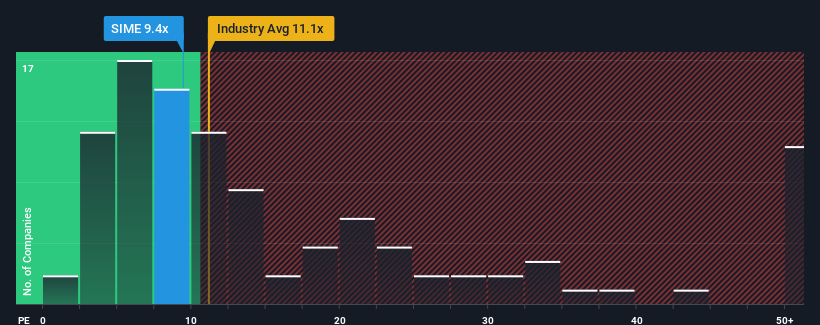- Malaysia
- /
- Industrials
- /
- KLSE:SIME
Why Investors Shouldn't Be Surprised By Sime Darby Berhad's (KLSE:SIME) Low P/E
Sime Darby Berhad's (KLSE:SIME) price-to-earnings (or "P/E") ratio of 9.4x might make it look like a buy right now compared to the market in Malaysia, where around half of the companies have P/E ratios above 17x and even P/E's above 33x are quite common. Nonetheless, we'd need to dig a little deeper to determine if there is a rational basis for the reduced P/E.
Recent times have been advantageous for Sime Darby Berhad as its earnings have been rising faster than most other companies. One possibility is that the P/E is low because investors think this strong earnings performance might be less impressive moving forward. If you like the company, you'd be hoping this isn't the case so that you could potentially pick up some stock while it's out of favour.
View our latest analysis for Sime Darby Berhad

Does Growth Match The Low P/E?
The only time you'd be truly comfortable seeing a P/E as low as Sime Darby Berhad's is when the company's growth is on track to lag the market.
Retrospectively, the last year delivered an exceptional 76% gain to the company's bottom line. The strong recent performance means it was also able to grow EPS by 32% in total over the last three years. Therefore, it's fair to say the earnings growth recently has been superb for the company.
Shifting to the future, estimates from the analysts covering the company suggest earnings should grow by 1.6% per year over the next three years. Meanwhile, the rest of the market is forecast to expand by 14% each year, which is noticeably more attractive.
In light of this, it's understandable that Sime Darby Berhad's P/E sits below the majority of other companies. It seems most investors are expecting to see limited future growth and are only willing to pay a reduced amount for the stock.
The Final Word
We'd say the price-to-earnings ratio's power isn't primarily as a valuation instrument but rather to gauge current investor sentiment and future expectations.
As we suspected, our examination of Sime Darby Berhad's analyst forecasts revealed that its inferior earnings outlook is contributing to its low P/E. Right now shareholders are accepting the low P/E as they concede future earnings probably won't provide any pleasant surprises. Unless these conditions improve, they will continue to form a barrier for the share price around these levels.
Before you settle on your opinion, we've discovered 1 warning sign for Sime Darby Berhad that you should be aware of.
You might be able to find a better investment than Sime Darby Berhad. If you want a selection of possible candidates, check out this free list of interesting companies that trade on a low P/E (but have proven they can grow earnings).
New: Manage All Your Stock Portfolios in One Place
We've created the ultimate portfolio companion for stock investors, and it's free.
• Connect an unlimited number of Portfolios and see your total in one currency
• Be alerted to new Warning Signs or Risks via email or mobile
• Track the Fair Value of your stocks
Have feedback on this article? Concerned about the content? Get in touch with us directly. Alternatively, email editorial-team (at) simplywallst.com.
This article by Simply Wall St is general in nature. We provide commentary based on historical data and analyst forecasts only using an unbiased methodology and our articles are not intended to be financial advice. It does not constitute a recommendation to buy or sell any stock, and does not take account of your objectives, or your financial situation. We aim to bring you long-term focused analysis driven by fundamental data. Note that our analysis may not factor in the latest price-sensitive company announcements or qualitative material. Simply Wall St has no position in any stocks mentioned.
About KLSE:SIME
Sime Darby Berhad
Provides automotive and industrial equipment in Malaysia, China, Australasia, and the Asia Pacific.
Undervalued with excellent balance sheet and pays a dividend.
Similar Companies
Market Insights
Community Narratives




